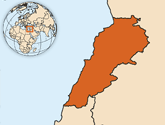11 September 2019 ‒ The WHO Centre for Environmental Health Action, in collaboration with the American University of Beirut Nature Conservation Center, organized a 2-day training session, from 5 to 6 September 2019, to train specialists in assessing air quality and environmental risks in Lebanon. The training was part of an overall framework to address environmental health degradation in the country and collect evidence of the health impacts of air pollution in line with the Air Quality and Health Road Map. Interventions intend to not only mitigate the effects of air pollution but also climate change and accelerate progress towards the targets of the Sustainable Development Goals.
 WHO Representative Dr Iman Shankiti with Dr Michel Kfoury (L) and Mr. Mazen Milkawi
WHO Representative Dr Iman Shankiti with Dr Michel Kfoury (L) and Mr. Mazen Milkawi
Over 45 representatives from various ministries, research centres, universities, Order of Nurses and Physicians, municipalities, the World Bank, United Nations agencies and local organizations attended the workshop. The diversity of the participants highlighted the fact that air quality management to protect health requires a multisectoral approach.
Participants were introduced to the health impact of air pollution and the air quality monitoring system in Lebanon. During working group sessions, it was agreed that there was a need to strengthen collaboration between the private and the public sector in order to better disseminate information on the issue and raise public awareness. Participants also took part in a practical exercise to estimate the health impacts of air pollution using the WHO software tool Air Q+. AirQ+ is a health risk assessment and modelling tool that calculates the health effects of long-term exposure to both ambient and household (indoor) air pollution and allows estimations in life expectancy and health effects as air pollution levels change.
The workshop concluded in a set of recommendations, including:
- Establish a mechanism to coordinate and follow up on the efforts and contributions of all related sectors in accelerating progress towards protecting the public from the adverse health effects of both indoor and outdoor air pollution.
- Use the health impact assessment of air pollution as a tool to provide evidence that can be used to advocate for action at different levels and by different sectors.
- Establish a sustainable operational system to collect reliable air quality data and health and population statistics.
- Strengthen collaboration between all sectors towards standardization of air quality monitoring and reliability of air quality and health data.
- Establish a communication health information system on air pollution and on how to minimize the health impacts of air pollution.
Related links
AirQ+: software tool for health risk assessment of air pollution








